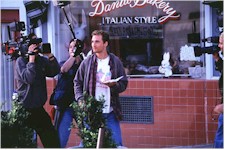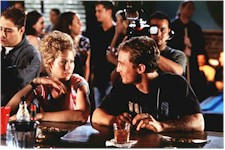|
| |
Edtv
Review by Gregory Avery
Posted 2 April 1999
 |
|
Directed by Ron Howard. Starring
Matthew McConaughey, Jenna Elfman,
Woody Harrelson, Ellen DeGeneres, Sally Kirkland,
Martin Landau, Elizabeth Hurley, Adam Goldberg,
Clint Howard and Rob Reiner.
Screenplay by Lowell Ganz and Babaloo Mandel,
suggested from the 1994 film
Louis XVI, le Roi de Ondes
(Louis the 16th, King of the Airwaves). |
In Ed tv, Matthew McConaughey, rangy and with a
thatch of ugly stubble on his chin, plays Ed Pekuny, a guy who, unconcerned and
unambitious, shuffles through life as he goes back and forth from his apartment to the
video store in the North Beach area of San Francisco where he works as a clerk,
recommending unsophisticated comedies to the customers. His apartment is an amiable mess.
Wearing shapeless clothes, he shoots pool at the corner pub while wearing a beer bottle
around his neck, attached with a string. This is the guy who is chosen to have his life
broadcast live, uncut, twenty-four hours a day, for all America to see. In short, the
movie asks us to identify with a guy who is a slob.
 This is contemptible
enough, but it is particularly demoralizing because the picture has been made by Ron
Howard, who has spent much of his life in the past on film and TV stages, and who has
directed some pretty decent pictures of late. He appears to be an intelligent, articulate,
and thoughtful man, and he captures some of the details of sudden fame, such as the casual
cruelties inflicted upon those who are thrust into the media spotlight, whether they like
it or not, in a way that other directors might not have. But the picture that emerges,
here, is a fairly condescending one, and I don't know if a lot of it was intentional or
not. The debased modern-day society that emerges in it would've needed someone who had a
lot more edge in their style to make it work as a film. This is contemptible
enough, but it is particularly demoralizing because the picture has been made by Ron
Howard, who has spent much of his life in the past on film and TV stages, and who has
directed some pretty decent pictures of late. He appears to be an intelligent, articulate,
and thoughtful man, and he captures some of the details of sudden fame, such as the casual
cruelties inflicted upon those who are thrust into the media spotlight, whether they like
it or not, in a way that other directors might not have. But the picture that emerges,
here, is a fairly condescending one, and I don't know if a lot of it was intentional or
not. The debased modern-day society that emerges in it would've needed someone who had a
lot more edge in their style to make it work as a film.
Ed's family, who hail from Texas, and who are also apparently supposed to represent the
American mainstream at-large, includes a preening but wretched-looking mother (the
fearless Sally Kirkland), a stepfather who gets around in a tatty mobile chair (Martin
Landau, who nonetheless delivers his resistible dialogue with impeccable timing and
skill), and his brash, loudmouthed older brother Ray (Woody Harrelson), who dreams of
opening a gym, and sees the exposure through the new TV show featuring Ed as the perfect
way to get started. In the meantime, he dumps on his girlfriend, Shari (Jenna Elfman), who
then takes up with Ed on the rebound. The country is glued to these pathetic little dramas
as they are played out, and Ed becomes the center of attention. Polls are published as to
whether he should continue seeing Shari or dump her for another, prettier girl. (Jenna
Elfman's face radiates charm, but it's sometimes a little hard to tell from the brownish
cinematography in which this movie has been shot).
For the most part, Matthew McConaughey pastes a grin on his face and lopes through this
role with the same sheepish charm he has been using for years. He is a celebrity who has
become a movie star without displaying any discernable acting talent, yet, and it is
difficult to tell if Ed is suppose to be famous in the film because he lacks any definite
characteristics or not. He comes across as being both guileless and stupid, and the public
in the film loves him for it. When he is introduced to a hot little number (Elizabeth
Hurley) after being interviewed on Jay Leno's show, she snags him into coming over to her
place, and the crowds which already follow Ed around become Academy Awards-size
proportions. People are just dying to see what'll happen next! Ed appears to have no idea
that he is being duped into having sex on live television. He is accommodating to a fault,
but it is unclear as to whether he wants or cares about being used to such a humiliating,
and degrading, extent. McConaughey doesn't give Ed any sort of interior life; like his
character, he slides right through most of his scenes.
 The picture raises a
lot of questions that it doesn't answer, ranging from just how much people want to act out
in front of TV cameras, to what extent TV validates what happens in our lives, and just
how much people want to watch programming that is devoid of taste. One of the unspoken
reasons people watched the PBS series "An American Family" in the Seventies was
to see to what extent the Loud family breaks apart because they have allowed camera crews
to constantly film their lives. On the other hand, one of the reasons teenagers seem to
want to appear on MTV's "The Real World", to be bottled up, have their privacy
invaded and their every little peccadillo recorded, is because of the fleeting fame the
exposure may bring (Both shows are referred to in the movie, right up front). Ed tv
eventually twists itself around to where the show's cable channel producer (Ellen
DeGeneres, who shows every sign of becoming a fine screen comedian) starts cueing and
manipulating Ed into doing things which are supposed to be part of the "normal"
life that he is contractually obligated to deliver. But, then, the film breaks its trust
with the audience when Ed decides that he doesn't want to be on-camera, anymore. We expect
that the film will show something like Ed's fanatical public following gradually voicing
and showing their support in having Ed's wishes respected, something that will show or
spark some growth or development in Ed's character. Instead, the picture turns into a very
cynical affair, indeed. As a way of shaming the cable channel into pulling the plug on his
show, Ed announces that he will dish some ruinous dirt on the executives who run it (and
have been paying him enormous amounts of money in the process), live and on the air: he
will get up in front of everybody and tell dirty stories. Granted, there have been some
people who have been doing this lately, in very public arenas, and getting a lot of
attention for it, but it hasn't necessarily made them respectable or honorable. After both
exploiting and showing Ed's character being exploited, the picture ends up, in the end,
stripping him of whatever dignity he may have had left, and whatever we may have felt
towards him. He ends up, like everyone and everything else around him, pandering to the
lowest common denominator. The picture raises a
lot of questions that it doesn't answer, ranging from just how much people want to act out
in front of TV cameras, to what extent TV validates what happens in our lives, and just
how much people want to watch programming that is devoid of taste. One of the unspoken
reasons people watched the PBS series "An American Family" in the Seventies was
to see to what extent the Loud family breaks apart because they have allowed camera crews
to constantly film their lives. On the other hand, one of the reasons teenagers seem to
want to appear on MTV's "The Real World", to be bottled up, have their privacy
invaded and their every little peccadillo recorded, is because of the fleeting fame the
exposure may bring (Both shows are referred to in the movie, right up front). Ed tv
eventually twists itself around to where the show's cable channel producer (Ellen
DeGeneres, who shows every sign of becoming a fine screen comedian) starts cueing and
manipulating Ed into doing things which are supposed to be part of the "normal"
life that he is contractually obligated to deliver. But, then, the film breaks its trust
with the audience when Ed decides that he doesn't want to be on-camera, anymore. We expect
that the film will show something like Ed's fanatical public following gradually voicing
and showing their support in having Ed's wishes respected, something that will show or
spark some growth or development in Ed's character. Instead, the picture turns into a very
cynical affair, indeed. As a way of shaming the cable channel into pulling the plug on his
show, Ed announces that he will dish some ruinous dirt on the executives who run it (and
have been paying him enormous amounts of money in the process), live and on the air: he
will get up in front of everybody and tell dirty stories. Granted, there have been some
people who have been doing this lately, in very public arenas, and getting a lot of
attention for it, but it hasn't necessarily made them respectable or honorable. After both
exploiting and showing Ed's character being exploited, the picture ends up, in the end,
stripping him of whatever dignity he may have had left, and whatever we may have felt
towards him. He ends up, like everyone and everything else around him, pandering to the
lowest common denominator.
Contents | Features | Reviews
| Books | Archives | Store
Copyright © 1999 by Nitrate Productions, Inc. All Rights Reserved.
| |
|